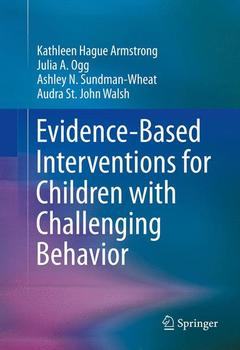Evidence-Based Interventions for Children with Challenging Behavior, 2014

When a child has difficulties eating or sleeping, or throws frequent tantrums, many parents cross their fingers and hope it's a phase to be outgrown soon. But when they persist, challenging behaviors can follow children to school, contributing to academic problems, social difficulties, and further problems in adolescence and adulthood.
The authors of Evidence-Based Interventions for Children with Challenging Behavior take a preventive approach in this concise, well-detailed guide. Offering best practices from an extensive Response to Intervention (RTI) evidence base, the book provides guidelines for recognizing the extent of feeding, sleeping, toileting, aggression, and other issues, and supplies successful primary, secondary, and tertiary interventions with rationales. Case examples integrate developmental theories and behavior principles into practice, illustrate how strategies work, and show how to ensure that parents and caregivers can implement them consistently for maximum effect. Progress charts, content questions, and other helpful features make this an invaluable resource for students and professionals alike.
Included in the coverage:
- The prevention model and problem solving.
- Screening techniques.
- Evidence-based practices with children and their caregivers.
- Behavior principles and their application.
- Monitoring progress and evaluating outcomes.
- Plushelpful appendices, resource links, and other learning tools.
Chapter 1: Common Early Childhood Behavior Problems.- Chapter 2: Early Childhood Development Theories.- Chapter 3: The Prevention Model and Problem Solving.- Chapter 4: Screening Techniques.- Chapter 5: Evidence-Based Practices with Children and their Caregivers.- Chapter 6: Behavioral Terms and Principles.- Chapter 7: Applying Principles of Behavior.- Chapter 8: Progress Monitoring.- Chapter 9: Evaluating Outcomes.- Chapter 10: Summary & Conclusions of Best Practices in Providing Services for YCCB.- Appendix A: Developmental Milestones References.- Appendix B: ABC Chart for Determining a Behavior’s Function.- Appendix C: HOT DOCS Behavior Chart.- Appendix D: Graphing by Hand.- Glossary of Terms.- References.
Kathleen Hague Armstrong, Ph.D., is a professor of Pediatrics at the University of South Florida College of Medicine, licensed psychologist and President of Florida Association of Infant Mental Health. She has extensive experience working with young children and families with behavioral issues, graduate teaching, and has authored several articles and book chapters on early childhood issues and parenting.
Julia A. Ogg, Ph.D., is an Assistant Professor in the School Psychology Program the University of South Florida, and is trained in recognized evidence-based programs including The Incredible Years and Parent Child Interaction Therapy.
Ashley N. Sundman-Wheat, B.A., is completing her doctoral internship in Pediatrics and School Psychology and has extensive work experiences in early childhood settings, such as Head Start.
Audra St. John Walsh, M.S., is completing her doctoral training in School Psychology, and comes with a strong background in early intervention. She is a licensed Infant/Toddler Developmental Specialist.
Ouvrage de 234 p.
15.5x23.5 cm
Thèmes d’Evidence-Based Interventions for Children with... :
Mots-clés :
Applied behavior analysis and early childhood intervention; Attachment theory in early childhood; Behavior problems in young children; Challenging behavior problems in early childhood; Cognitive theory and early childhood development; Early childhood behavior problems; Early childhood development; Early childhood developmental theories; Early childhood intervention; Early intervention providers; Ecological systems theory and early childhood development; Evidence-based interventions for young children; Functional assessment of young children; Intensive intervention during early childhood; Prevention and early intervention in early childhood; Progress monitoring of young children; Response to intervention and developmental challenges; RtI model and healthy childhood development



